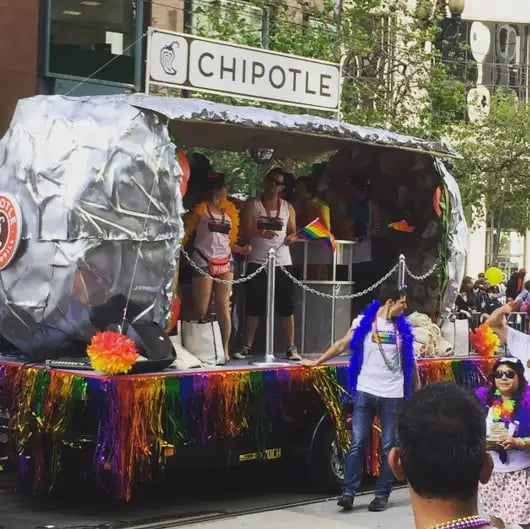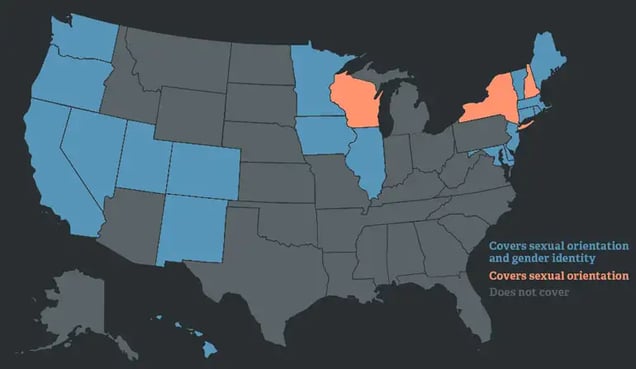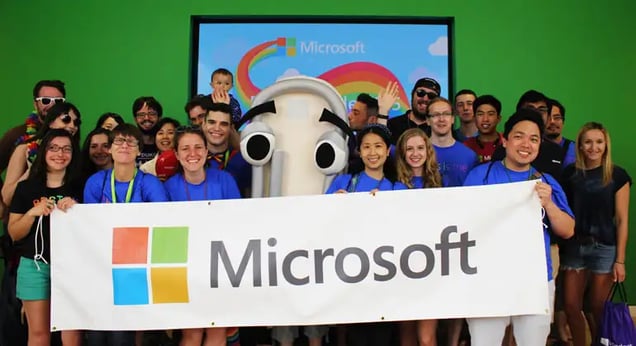I can see a lot of unicorns in the room. I’m talking about real life unicorns with blue and green hair, as opposed to tech startups. Men and women parading around with cotton candy ponytails, and slogan t-shirts sponsored by Unicorn Booty, an online magazine with the tagline ‘forward thinking trouble makers.’
The unicorns I’m surrounded by are attendees at GaymerX 2015, a San Jose-based convention that proudly calls itself a ‘queer space for gaming culture.’ Because of the location (the heart of Silicon Valley) and the content (gaming = nerds), the majority of attendees are men who work in the industry or related tech fields.
Now Silicon Valley is thought of as an open, innovative space where creativity and pixie dust is plentiful. The Neverland of the adult world. But it’s also associated with sexism (less than 10% of hires are women) and an entrenched bro-culture that can create spaces that are uncomfortable for LGBT people.
Think about it. Can you name one flamboyantly open gay man in the startup scene? Or the gaming world?
But wait, you cry. Silicon Valley is super close to San Francisco, the heart of the LGBT movement. Sure, San Francisco’s Pride parade is a who’s who of the startup scene, each float promoted by Uber, Netflix etc… But does that translate into “out” people at Google, Apple and Microsoft?

Chipotle Truck at San Francisco Pride 2015 Photographer: Zara Stone
Not necessarily, according to David Gaider, a writer for games company BioWare and one of the creators of DragonAge, BioWare’s best selling game. “I was accustomed to keeping my personal life separate,” Gaider told GaymerX attendees during a panel about being a gay in gaming.
This was because when he started at BioWare, his team was young; recently out of college. “It felt a little frat boy-ish,” he said. For years Gaider hid his sexuality, feeling it didn’t connect to the company culture. But then an email went around the company. One of his gay colleagues was getting married to his boyfriend. “Responses were awesome, people went yay!” Gaider said. “I thought there’d be a public outroar, but it was fine. I was sad how I’d underestimated the people I’d worked with.”
Gaider’s positive experience at BioWare is something that – perhaps surprisingly – many people in tech can relate to. The general consensus pre-coming out seems to be one of fear and then surprise at the acceptance. But the fear is something that keeps people from coming out, no matter how likely they are to be welcomed. A Gallup poll showed San Francisco as having the highest gay population in America, and San Jose, a mere 48 miles away, as one of the lowest.
Entrepreneur Peter Thiel believes this is partly due to how LGBT people are perceived from a larger viewpoint.
“A lot of these businesses are global in reach, and when you have customers all over the world, it becomes a question of ‘Will they hold that (being gay) against you?” Thiel told Business Insider. “It’s not really a question of how tolerant people are in California.”
This is relevant because firing someone for their sexuality is currently legal in 28 states. And in countries like South Africa, Russia, China, and Japan homosexuality is frowned upon. In Saudi Arabia and Nigeria it carries a death sentence.

But back to Silicon Valley and the rise of the thumbs up gay culture.
“For as long as I have been in business and running companies, I’ve been an out gay man,” Robert Hanson, current CEO of John Hardy and former CEO of American Eagle Outfitters told Time. “The issues we face can be effectively eliminated through the greater visibility of high-performing publicly gay executives, the open support of boards and shareholders, and a balanced dialog on the subject from the media.”
But Hanson understands why some might hide their sexuality. “Remaining closeted is not, in most cases, due to a lack of courage, authenticity or integrity,” he explained. “This is their conundrum: They’ve been hired primarily to drive performance and deliver returns; but they are also supposed to serve as champions and role models for a wide swath of people, and do not want their sexual orientation to overwhelm or distract from their impact and tenure.”
We can’t say he’s wrong. Tim Cook’s statement has forever branded him as the gay CEO of Apple. His accomplishments will be noted for his technological advances, and for progressing gay rights. They’ll be inextricably linked in the history books of the future.
Cook might be the only publicly out CEO of a Fortune 500 company, but there are many household names who have declared themselves out and proud. Chris Hughes, co-founder of Facebook; Jason Goldberg, CEO of Fab.com; Nick Denton, founder of Gawker Media; Megan Smith, CTO at the White House and former vice president at Google X; and Glen Senk, former CEO of Urban Outfitters.
This prevalence has led to wider acceptance and the creation of LGBT-supportive policies. 93% of companies on the corporate equality index (CEI), as defined by The Human Rights Campaign, currently have LGBT policies in place. In 2002 only 5% of companies had this.
And changes are in the office as well. Microsoft has GLEAM (Gay and Lesbian Employees at Microsoft) that arranges networking and outreach events for employees. And Electronic Arts (EA) has been noted as one of the “best places to work for LGBT equality.”

The Boston GLEAM team Source: Microsoft new England
“We believe that fostering an inclusive environment helps us to create great games, and represent our diverse set of players and I’m proud to work at a company that has strong employee values,” said Andre Chambers, head of Diversity & Inclusion at EA. And this year, popular game Rock Band partnered with gay dating app SCRUFF 5 to give free song downloads.
Think about that for a second. Rock Band, a game with over 13 million copies sold that’s raked in $1 billion plus in revenue is publicly supporting SCRUFF 5, a gay dating app that mostly features topless guys looking for love. This is a brand that publicly talks about how it’s family friendly, and with this collaboration EA is emphatically saying that gay families count every bit as much. Kudos to them.
And this sentiment is echoed throughout modern business culture. Currently 75% of the Fortune 500 companies offer protections and policies for LGBT employees. People are demanding that their voices be heard. And this is nationwide; in 2014, Mozilla CEO Brendan Eich stepped down as CEO after public outcry at his anti-gay marriage stance. We might not have unified acceptance, but we do have majority acceptance.
There are other elements that affect how businesses treat gay workers. “The most important reason for the tech sector’s embrace of gay rights is pure economics,” Rakesh Sharma writes in Forbes. “The power of the pink dollar is already well-known. Within the tech economy that dollar goes even further because gays are prominent customers and creators in the economy. Tech titans’ support for gay rights has generated enormous goodwill and free marketing for their products among gay communities.”
That’s a little less kumbaya and more green eyed dollar signs, but the end result is the same. There’s still work to be done — in 2013, Pew Research found 21% of LBGT employees were discriminated against at work, but the positive changes happening in the industry should hopefully decrease this number.
“Coming out is not a single time event,” said Matt Conn, CEO of MidBoss and founder of GaymerX. “We do it over and over as we meet new people.”
Think about it. You come out to your family, to your colleagues. Deep breath, pat on the backs, it’s over. But then someone new joins… or you move jobs. You need to do all this again. It’s exhausting.
“You know the moment you put being gay out there you have an asterisk next your name. You’re no longer a developer, you’re a developer who is gay,” said Gaider. “You don’t know if you want that asterisk.”
But this is a bigger issue about identity, not one about being out in the tech world.
“My sense is both Silicon Valley and Seattle have a tech scene that is pretty dang progressive,” Ben Elowitz, co-founder of Wetpaint and Blue Nile, told GeekWire. “When you are so competitive for great talent, you don’t have time to worry about things that get in the way of getting great talent. There’s room for diversity, sure.”
This is backed up by the number of companies who supported the same sex marriage bill in early 2015. 379 companies urged the Supreme Court to consider this, including Aetna, Amazon, Ben & Jerry’s, eBay, and Intel.
And we can’t forget Tim Cook’s involvement, as his heartfelt disclosure is still echoing around the world, making ripples in the rainbow sea. “I valued my privacy but felt I was valuing it above the help I could give to people,” Cook said about his reveal.
The takeaway
2016 is the best time to be out and work in tech. Companies are set up to support you, your colleagues will most likely embrace you, and you have endless networking opportunities and role models like Tim Cook to look up to.
Sure, some people are going to be weird, and internationally the field is muddy, but who wants to play with people like that anyway?
“It’s been tough and uncomfortable at times, but it has given me the confidence to be myself, to follow my own path, and to rise above adversity and bigotry. It’s also given me the skin of a rhinoceros, which comes in handy when you’re the CEO of Apple.” – Tim Cook
The future is bright, and you are part of it.

Resources:
It’s a great time to be gay in Silicon Valley, but there are still things to be done. If you’re looking for support:
- StartOut is a nonprofit supporting LGBT entrepreneurs and workers that has chapters in many cities.
- Lesbians Who Tech is a community supporting women in technology.
